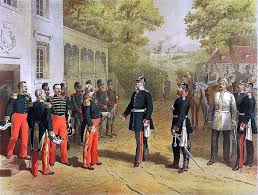Your basket is currently empty!
In the summer of 1870, a diplomatic crisis spiraled into full-scale war—sparked not by a formal declaration, but by a manipulated press release. This pivotal moment in European history began with the Ems Dispatch, a telegram originally sent by King Wilhelm I of Prussia to his chancellor, Otto von Bismarck. The message described a polite but inconclusive meeting between Wilhelm and the French ambassador, Count Benedetti, regarding the Spanish succession crisis.
Bismarck, a master of political strategy, edited the telegram to make it appear that both parties had insulted each other. He then released the altered version to the press on July 13, 1870, knowing it would provoke outrage in France. French newspapers published the inflammatory version, and public opinion turned sharply against Prussia. Under immense pressure from nationalists and the media, Napoleon III declared war on July 19, 1870, believing it would rally the nation and preserve French prestige.
However, the declaration was not delivered through traditional diplomatic channels. Instead, it was effectively triggered by media manipulation, making it one of the earliest examples of a war sparked by information warfare. The move backfired spectacularly. Prussia quickly mobilized its forces, and the German states united behind Wilhelm I. Within weeks, French forces suffered devastating defeats, culminating in Napoleon III’s capture at the Battle of Sedan on September 2, 1870.
The war’s outcome was catastrophic for France. The Second Empire collapsed, and the Third Republic was proclaimed just two days later. Bismarck’s calculated gamble not only humiliated France but also paved the way for the unification of Germany in 1871. Napoleon III’s reliance on public sentiment and press-fueled nationalism proved to be a fatal error—one that reshaped the balance of power in Europe for decades.

